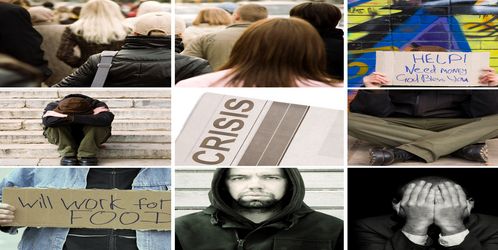Scissors

By Patrick Hall
I believe it was in the early 1980s when I had the opportunity to visit my hometown after spending over six years not seeing my mother nor any of my twelve siblings. I had spent the previous years out West in Texas, Alaska, Washington, and Montana. During my absence, one of my brothers had gotten into real estate, among his other business ventures, and was renting one of his homes to a family of Hmong-Vietnamese immigrants. One summer afternoon, my brother went over to this particular rental to fix a plumbing problem. He was greeted with the sight of the Vietnamese parents, along with their children, cutting a reasonably large lawn with scissors. I believe part of the rental agreement stipulated that the renters were responsible for such pedestrian activities. My brother was more than impressed with their effort and later provided the Hmong family with a push-mower. Sometime later, the Hmong father spotted a broken gas power mower in my brother’s maintenance lot. He asked if he could have this mower, and by the next day, the Hmong father had it working again. This impressed the hell out of my brother and the men working for him at the time.
This family and other Hmong refugees that he often rented to in the1970s and 1980s were always more than grateful. Sometimes, they were thankful to a fault, and my brother often felt they had nothing to be so overly beholden or apologetic. They were good renters and, more importantly, good individuals, with a character and grace often not found in many of us. It’s been forty years since that incident, but the image of this Vietnamese family cutting a lawn with scissors was, to say the least, a teaching moment.
Despite the inequalities, hardships, and setbacks they might face or experience, people are called to overcome life’s unfairness. Ultimately, whether we are White, Black, or Hmong, the past might be littered with some very horrendous events and situations. But to paraphrase the renowned Swiss psychologist Carl Jung, the past may be many things, but it is irrevocable. Whether we are Vietnamese immigrants (many of whom witnessed family members being murdered by their Communist liberators), or East Germans after the wall came down in 1989, who immediately wanted the socio-economic prosperity of their free West German brethren, restorative justice or “equity” is seldom if ever possible.
In recent months, we have seen the term “equity” being pushed as a goal to mitigate past or perceived occurrences of institutional racism in American culture. This effort by both the Democrat and Republican political classes tragically misses the lesson that suffering can be endured and overcome, but it can never be fully repaid. Even more tragic is, that African Americans can never be repaid for the injustices done to them, but they can (and have) been corrupted by society’s guilt gestures of repayment. Affirmative action and other Great Society programs of the Johnson Administration were such efforts.
Regarding African American “underclass," even long-term policies such as affirmative action have primarily turned out to be more of a public policy windfall for “middle-class blacks," college-educated white women, and foreign nationals with the right skin tone.1 Like multiculturalism and cultural diversity, equity is “divisiveness with a smile.”
As proposed by the current administration and being aggressively implemented by the Diversity, Equity, and Inclusion Industry, Equity is little more than entitlement by color, genitalia, or gender identifications. In short, equity is hardly a social program. In the case of African Americans, it’s a dubious reward, the ultimate participant trophy, for being black.
1. Patrick Hall, “Against Our Best Interests: An Ambivalent View of Affirmative Action,” American Libraries 22 (October, 1991): 898-902.
[Patrick Hall is a retired university library director. He is a graduate of Canisius College and the University of Washington, where he received three advance degrees. He has published in Freedom's Journal Magazine, America, Commonweal, Headway, Journal of Academic Librarianship, American Libraries and others. He currently volunteers at a local VA hospital in the town of Erie, Pa.]
I believe it was in the early 1980s when I had the opportunity to visit my hometown after spending over six years not seeing my mother nor any of my twelve siblings. I had spent the previous years out West in Texas, Alaska, Washington, and Montana. During my absence, one of my brothers had gotten into real estate, among his other business ventures, and was renting one of his homes to a family of Hmong-Vietnamese immigrants. One summer afternoon, my brother went over to this particular rental to fix a plumbing problem. He was greeted with the sight of the Vietnamese parents, along with their children, cutting a reasonably large lawn with scissors. I believe part of the rental agreement stipulated that the renters were responsible for such pedestrian activities. My brother was more than impressed with their effort and later provided the Hmong family with a push-mower. Sometime later, the Hmong father spotted a broken gas power mower in my brother’s maintenance lot. He asked if he could have this mower, and by the next day, the Hmong father had it working again. This impressed the hell out of my brother and the men working for him at the time.
This family and other Hmong refugees that he often rented to in the1970s and 1980s were always more than grateful. Sometimes, they were thankful to a fault, and my brother often felt they had nothing to be so overly beholden or apologetic. They were good renters and, more importantly, good individuals, with a character and grace often not found in many of us. It’s been forty years since that incident, but the image of this Vietnamese family cutting a lawn with scissors was, to say the least, a teaching moment.
Despite the inequalities, hardships, and setbacks they might face or experience, people are called to overcome life’s unfairness. Ultimately, whether we are White, Black, or Hmong, the past might be littered with some very horrendous events and situations. But to paraphrase the renowned Swiss psychologist Carl Jung, the past may be many things, but it is irrevocable. Whether we are Vietnamese immigrants (many of whom witnessed family members being murdered by their Communist liberators), or East Germans after the wall came down in 1989, who immediately wanted the socio-economic prosperity of their free West German brethren, restorative justice or “equity” is seldom if ever possible.
In recent months, we have seen the term “equity” being pushed as a goal to mitigate past or perceived occurrences of institutional racism in American culture. This effort by both the Democrat and Republican political classes tragically misses the lesson that suffering can be endured and overcome, but it can never be fully repaid. Even more tragic is, that African Americans can never be repaid for the injustices done to them, but they can (and have) been corrupted by society’s guilt gestures of repayment. Affirmative action and other Great Society programs of the Johnson Administration were such efforts.
Regarding African American “underclass," even long-term policies such as affirmative action have primarily turned out to be more of a public policy windfall for “middle-class blacks," college-educated white women, and foreign nationals with the right skin tone.1 Like multiculturalism and cultural diversity, equity is “divisiveness with a smile.”
As proposed by the current administration and being aggressively implemented by the Diversity, Equity, and Inclusion Industry, Equity is little more than entitlement by color, genitalia, or gender identifications. In short, equity is hardly a social program. In the case of African Americans, it’s a dubious reward, the ultimate participant trophy, for being black.
1. Patrick Hall, “Against Our Best Interests: An Ambivalent View of Affirmative Action,” American Libraries 22 (October, 1991): 898-902.
[Patrick Hall is a retired university library director. He is a graduate of Canisius College and the University of Washington, where he received three advance degrees. He has published in Freedom's Journal Magazine, America, Commonweal, Headway, Journal of Academic Librarianship, American Libraries and others. He currently volunteers at a local VA hospital in the town of Erie, Pa.]
Posted in Opinion
Posted in Patrick Hall, Hmong, poverty, Underclass, Equity, Hard work, Achievement, Freedoms Journal Institute, Freedoms Journal Magazine
Posted in Patrick Hall, Hmong, poverty, Underclass, Equity, Hard work, Achievement, Freedoms Journal Institute, Freedoms Journal Magazine
Recent
THE GEOPOLITICAL CHESSBOARD AND THE SPIRITUAL WAR WE’RE IGNORING--Part 1
March 2nd, 2026
The Heart of the Matter Is the Matter of the Heart
February 14th, 2026
People of Color can also steal…Duh?
February 14th, 2026
The Monroe Doctrine Isn’t Outdated — It’s Vital for American Security
January 5th, 2026
Defining Racism “UP”
January 4th, 2026
Archive
2026
January
2025
February
March
July
September
October
November
2024
January
Cartoon 01/01/24Cartoon 01/02/24Claudine Gay Betrayed the American Values of My Black Elders to Exploit White GuiltCartoon 01/03/24Cartoon 01/05/24Cartoon 01/06/24Cartoon 01/07/24Cartoon 01/08/24We need a David, not a SaulCartoon 01/13/24Cartoon 01/09/24Cartoon 01/10/24Cartoon 01/11/24Cartoon 01/14/24Cartoon 01/12/24What Happens to a King Deferred? A ReduxCartoon 01/15/24Cartoon 01/16/24The Good Guys with Guns Part 1Cartoon 01/17/24America Works. DEI Doesn’t.Cartoon 01/18/24Cartoon 01/23/24Good Guys with Guns Part 2Cartoon 01/19/24Cartoon 01/21/24Cartoon 01/22/24Cartoon 01/24/24Cartoon 01/26/24Cartoon 01/25/24Cartoon 01/27/24
February
Cartoon 02/04/24Cartoon 02/03/24Cartoon 02/02/24Cartoon 02/01/24Cartoon 01/31/24Cartoon 01/28/24Cartoon 01/29/24We’ve Been Gay(ed) Part 1Cartoon 02/05/24Cartoon 02/06/24Cartoon 02/07/24Cartoon 02/08/24Cartoon 02/13/24Cartoon 02/12/24Cartoon 02/09/24Cartoon 02/11/24Cartoon 02/10/24Cartoon 02/19/24'Black America at Crossroads’ of Culture Wars as Presidential Election LoomsWe’ve Been Gay(ed) Part 2Cartoon 02/18/24Cartoon 02/17/24Cartoon 02/16/24Cartoon 02/15/24Cartoon 02/14/24Cartoon 02/22/24Cartoon 02/21/24Cartoon 02/20/24America Needs a “Black Wives Matter” Movement To Rebuild the Black FamilyCartoon 02/23/24Cartoon 02/24/24Cartoon 02/25/24Cartoon 02/26/24Cartoon 02/27/24

No Comments